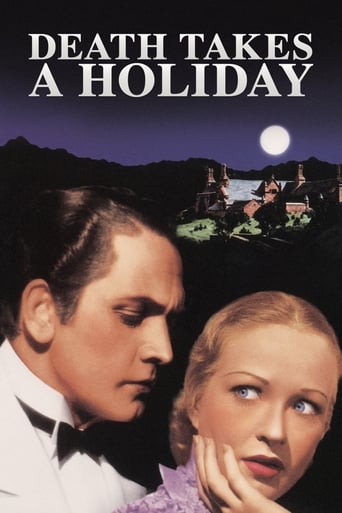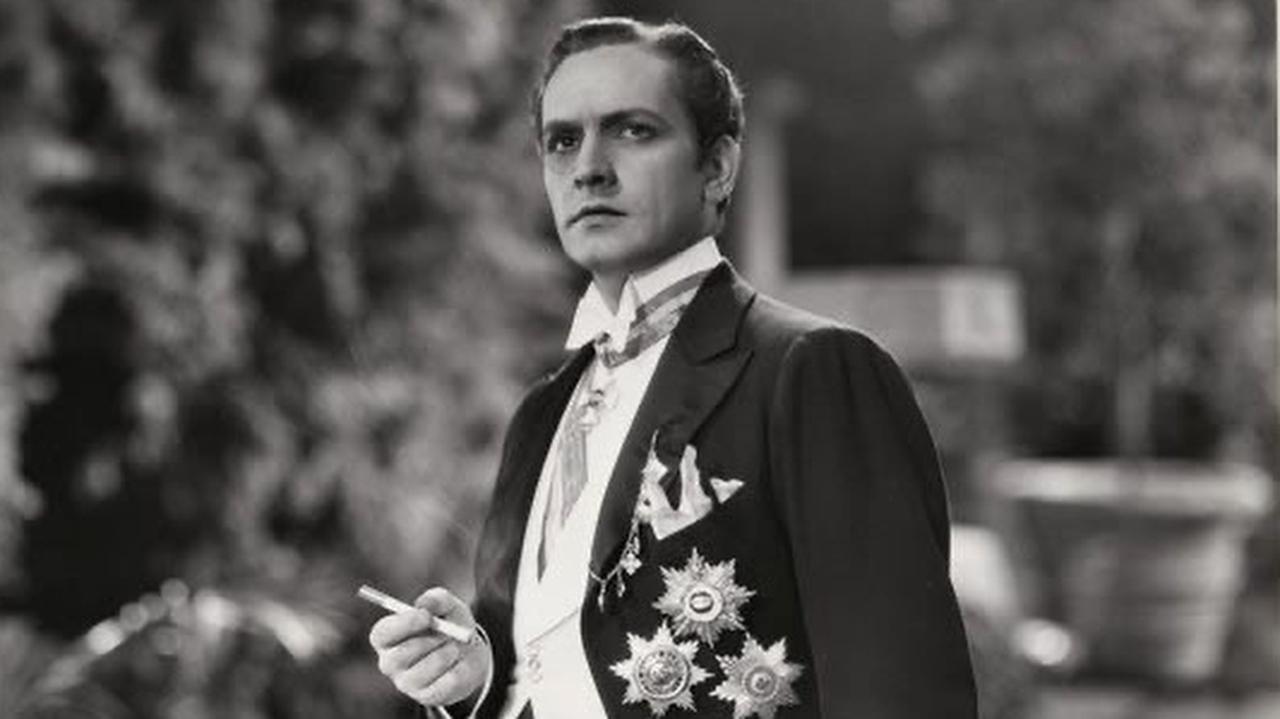coco-121
The story line is nothing like Meet Joe Black. The only thing the two movies have in common is that Death decides to take human form to find out why the living resist Death. The characters are typical of movies of this era - overacted, overly dramatic, too much makeup, almost comical. Death in 1934 forgets that he's trying to keep his identity secret, and he keeps letting slip little comments that reveal who he is. Death in 1998 has no such confusion; he is who he is, and it's for others to figure out why certain things amaze him so, such as peanut butter, tea cookies and the closeness of a woman. I thought the 1998 version was much richer, the premise was much more meaningful - taking human form so that he could learn from a man of good character why a life well lived had such great value. The 1934 Death seemed to just stumble upon this household of shallow elites who loved fast cars and parties. 1934 Death's focus seemed to be on women, and one melancholy woman in particular who welcomed Death into her life. His grand realization was that romantic love was the reason people resisted Death (huh?). The whole premise of the earlier movie just wasn't as deep as the later version. If you like the overly dramatic silliness of early movies, you'll probably enjoy this one. I was disappointed. In the category of early movies, this didn't come close to films like "It Happened One Night."
Brandt Sponseller
Adapted by Walter Ferris, Maxwell Anderson and Gladys Lehman from Alberto Cassella's 1929 play La Morte in Vacanze, Death Takes a Holiday features Fredric March as the titular Grim Reaper. Death becomes curious about why he is so feared. He wants to understand humankind better. So through some unspecified means he becomes corporeal for a three-day period, beginning and ending at midnight. He chooses to take the form of a Prince Sirki, recently deceased, and takes his holiday at the palatial Italian villa of Duke Lambert (Guy Standing). Will he discover what makes humans tick in only three days? This is a highly successful, unusual film. It has strong touches of horror, even though it's more of an art-house drama cum romance flick. It's also frequently philosophical, and director Mitchell Leisen easily sustains dramatic tension for close to 90-minutes despite the fact that this was only his second feature, and a very "talky" one at that, which takes place primarily in a single setting (the play only had one set, but the film adds a couple other scenes).Of course March's performance is crucial to making the film work. He has the difficult task of playing both a personification of a menacing supernatural force and a chimerical human trying to "act natural" and slightly failing. That March plays the role so impeccably is made all the more fascinating in light of the fact that he was filming All of Me (1934) at the same time. He borrowed a woman's bicycle (his wife Florence Elridge's) to enable him to quickly travel from one set to the other on the Paramount studio lot. March has said that Death/Prince Sirki was one of his favorite roles, and he willingly reprised it both on radio for Lux Radio Theater in March of 1937 and on stage, in a production by Baltimore City College in May of 1938.As impressive as March is, he is initially upstaged by the fantastic special effects. We first see Death as simply a shadow. Later, March appears in more traditional Grim Reaper garb, which is eerily transparent and surprisingly modern in design. Leisen demanded that the transparency effect be achieved in-camera rather than a later manipulation during the film processing stage. So Gordon Jennings employed the same technique that made The Invisible Man (1933) invisible. Parts of the set were recreated in black velvet. These were reflected in a partially transparent mirror, which was then superimposed over March (you can see a related effect "live" in the ballroom scene of Walt Disney World's The Haunted Mansion ride). March's elaborate cloaks were composed of layers of chiffon in dark hues from gray to black. Jennings also installed tiny lights under March's "hood" to light up his skull make-up.The rest of the cast is excellent, too, if maybe a bit too sprawling for the film's length. But there needs to be a larger number of characters, as a hinge of the film is that three different women fall in love with Prince Sirki during his brief visit, one of them eventually being discouraged by his bizarre behavior, the other by being able to see his "true self". Sirki ends up falling in love with Grazia (Evelyn Venable, in her second role after 1933's Cradle Song), who is supposedly the fiancée of Corrado (Kent Taylor), but with him, she is oddly aloof. Despite the romance between Death/Sirki and Grazia, March and Venable never kiss in the film, as Venable's father had a clause written into her contract forbidding it.Leisen creates a thick, almost creepy atmosphere for much of the film (although it's strongest when Duke Lambert first encounters Death), which gives it much of its horror overtones. For me, the romance aspect has a slight (appropriate) morbidity because of this, and it's questionable whether the film should even be considered a romance. The set design is also fantastic--the villa is breathtaking; it's too bad Leisen couldn't show it off more.The constant tension invoked by Death/Sirki always being on the brink of "blowing his cover" keeps the viewer on the edge of their seat more often than one might expect. But Death Takes a Holiday is most fascinating when it waxes philosophical. Because death is on holiday, numerous accidents occur that people just walk away from (this was an intriguing and logical aspect that was absent from the 1998 remake, Meet Joe Black). This makes the newspapers, and Death finds it particularly ironic that humans seem to almost lament that war is not working correctly. He promises to the unwitting that humankind will soon again be able to blow each other up. Baron Cesarea (Henry Travers, who also played Dr. Cranley in The Invisible Man) offers that there are three "games" in life--money, war and love, and Death/Sirki ends up agreeing. Love finally gives him the answer of why humankind fears him so, and finally shows why life is not futile or simply a frittering away of time while people wait for him to arrive in his natural guise. The ending of the film was quite controversial, and suggests that love can even surmount death; it almost seems to say that possessing love, death might not be such a bad thing after all.
MARIO GAUCI
Despite some stilted dialogue and acting, this is an exquisitely opulent fantasy about the meaning of life which seamlessly mixes elements of comedy, romance and horror and emerges as an unjustly neglected minor classic - so much so that dear old Universal has deemed it fit to only give it a DVD release by proxy, unceremoniously slapping it onto their "Ultimate Edition" DVD of its overblown and unnecessary remake, MEET JOE BLACK (1998). Fredric March is superb in the lead and only confirms his position as one of Hollywood's finest, most versatile and consistent character actors (despite being blessed with matinée idol looks); March himself considers this to be one of his favorite roles. This was only Mitchell Leisen's second film as director, and his production designer past is still much in evidence, but he would go on to make several accomplished films - particularly EASY LIVING (1937), MIDNIGHT (1939), ARISE, MY LOVE (1940) and KITTY (1945) - before his career gradually petered out in the late 40s. A strikingly similar film to DEATH TAKES A HOLIDAY which I also would love to watch is Harold S. Bucquet's ON BORROWED TIME (1939) with Sir Cedric Hardwicke playing Death and Lionel Barrymore as his unwilling "client" - but it never seems to get shown on TV in my neck of the woods!
gftbiloxi
Based on an Italian play that performed on Broadway in 1929, the 1934 DEATH TAKES A HOLIDAY would be the inspiration for the 1998 Brad Pitt film MEET JOE BLACK--but whereas MEET JOE BLACK proved a highly literal interpretation of the theme, DEATH TAKES A HOLIDAY is unexpectedly lyric in tone.The story is a fantasy. Death has grown weary of the fear he inspires in human beings, and in an effort to understand the tenacity to which they cling to life he decides to take a three day "holiday." He accordingly presents himself at the house of an Italian nobleman as "Prince Sirki," and soon discovers that human beings pass their lives in games, none of them of any great importance or interest. But there is one "game" he has yet to play: love.Like many films of the early 1930s, the script is a bit talky and the cinematography a bit static; with the exception of Evelyn Venable (as Grazia) and Henry Travers (as Baron Cesarea) the cast, including the usually subtle Frederic March, tend to play in a somewhat theatrical manner. Even so, the overall tone of the film is unexpectedly touching, lyrical, and strangely lovely. It is also, on occasion, gently humorous. And before Death resumes his true identity and returns to the business of mortality, we receive unexpected food for thought.The film is not widely available on either DVD or VHS, nor is it frequently televised. That is unfortunate, for fans of 1930s cinema will find it darkly charming. Worth seeking out!Gary F. Taylor, aka GFT, Amazon Reviewer


 AD
AD



